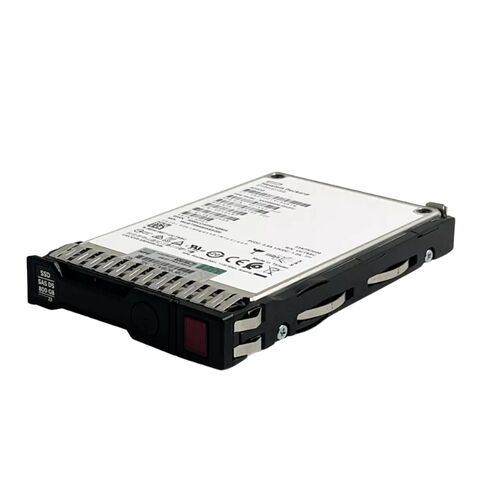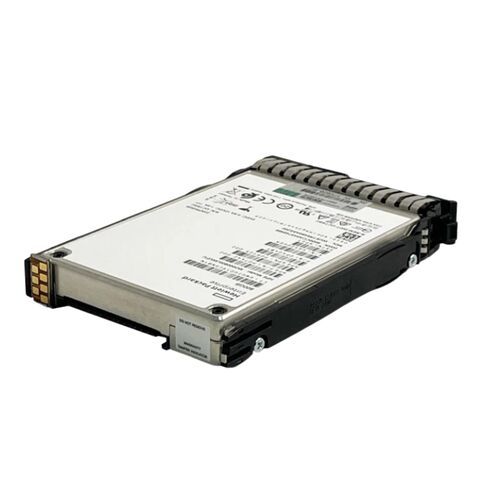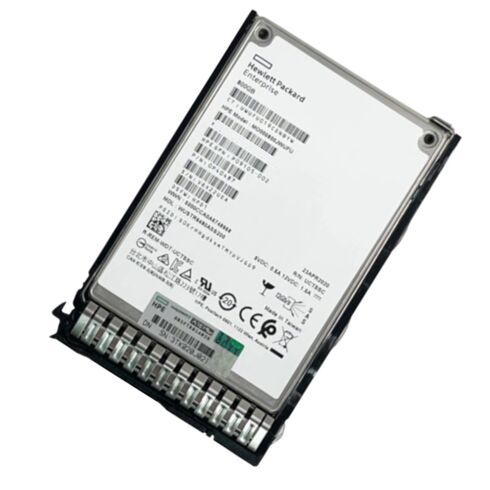741228-001 HPE SSD 800GB SAS 12GBPS Mainstream Endurance SFF Enterprise
- — Free Ground Shipping
- — Min. 6-month Replacement Warranty
- — Genuine/Authentic Products
- — Easy Return and Exchange
- — Different Payment Methods
- — Best Price
- — We Guarantee Price Matching
- — Tax-Exempt Facilities
- — 24/7 Live Chat, Phone Support
- — Visa, MasterCard, Discover, and Amex
- — JCB, Diners Club, UnionPay
- — PayPal, ACH/Bank Transfer (11% Off)
- — Apple Pay, Amazon Pay, Google Pay
- — Buy Now, Pay Later - Affirm, Afterpay
- — GOV/EDU/Institutions PO's Accepted
- — Invoices
- — Deliver Anywhere
- — Express Delivery in the USA and Worldwide
- — Ship to -APO -FPO
- — For USA - Free Ground Shipping
- — Worldwide - from $30
Product Overview of HPE 741228-001 SSD
The HPE 800GB 12G SAS Mainstream Endurance SFF 2.5-inch SC Enterprise Hot Plug Solid State Drive is specifically designed for use with Gen8 servers.
Manufacturer Details
- Brand: HPE
- Part Number: 741228-001
- Product Designation: Solid State Drive with Smart Carrier
- Endurance Type: Mainstream Endurance
- Drive Configuration: Internal
Technical Specifications
Key Features
- Storage Capacity: 800GB
- Form Factor: 2.5-inch
- Connection Type: SAS 12GB/s
Compatibility Information
Supported Systems
This solid-state drive is compatible with:
- HPE ProLiant Gen8 Servers
Drive Highlights
Advantages of the HPE SSD
- High performance with quick access times
- Enhanced reliability for demanding applications
- Efficient heat management and low power consumption
- Easy installation with hot-plug capability
Installation and Usage
Setup Guidelines
Follow the manufacturer's guidelines for optimal installation and performance to maximize the benefits of this SSD in your server environment.
Capacity: 800GB
The HPE 741228-001 SSD offers a remarkable capacity of 800GB, making it an ideal choice for users who require ample storage space for their data-intensive applications and workloads. This high capacity ensures that users can store a large amount of data without worrying about running out of space.
Benefits of 800GB Capacity
1. Efficient Data Storage: With 800GB of storage capacity, users can store a vast amount of data, including large files, documents, multimedia content, and databases. This allows for efficient organization and management of data, ensuring quick access whenever needed.
2. Enhanced Performance: The spacious capacity of 800GB enables users to run multiple applications simultaneously without experiencing any performance degradation. It eliminates the need to constantly free up storage space or worry about the system slowing down due to insufficient storage.
3. Room for Future Growth: Having a high-capacity SSD like the HPE 741228-001 provides users with room for future growth. As data requirements increase over time, the 800GB capacity ensures that users can expand their storage needs without the hassle of replacing or adding additional drives.
Importance of 800GB Capacity
1. Data-Intensive Workloads: In today's data-driven world, businesses and organizations deal with massive amounts of data on a daily basis. The 800GB capacity offered by the HPE 741228-001 12GBPS SSD is crucial for handling data-intensive workloads efficiently and ensuring smooth operations.
2. Resource-intensive Applications: Resource-intensive applications such as virtualization, big data analytics, and video editing require substantial storage space to perform optimally. The 800GB capacity allows users to seamlessly run these applications without compromising on performance or storage limitations.
3. Scalability and Flexibility: The 800GB capacity plays a vital role in providing scalability and flexibility to users. It allows for easy expansion of storage requirements as businesses grow and data needs increase. Users can add more data without worrying about limitations or the need for additional hardware.
Maximizing the 800GB Capacity
To make the most out of the 800GB capacity, users can consider implementing effective storage management practices:
1. Data Deduplication
Data deduplication is a technique that eliminates redundant data by identifying and storing only unique data blocks. By implementing data deduplication, users can significantly reduce the amount of storage space required, thus optimizing the usage of the 800GB capacity.
2. Compression
Compression reduces the size of files and data, allowing users to fit more information within the available space. By compressing data, users can maximize the utilization of the 800GB capacity while maintaining data integrity and minimizing storage costs.
3. Archiving and Tiered Storage
Archiving infrequently accessed or older data to lower-cost storage tiers can help optimize the usage of the 800GB capacity. By implementing tiered storage strategies, users can prioritize frequently accessed data on faster storage tiers while moving less critical data to lower-cost options.
Interface: SAS
The HPE 741228-001 SSD features a SAS interface, which stands for Serial Attached SCSI. This interface provides several benefits and is of great importance for users who require high-performance storage solutions.
Benefits of SAS Interface
1. High Data Transfer Rates: The SAS interface offers exceptional data transfer rates, allowing for speedy retrieval and storage of data. With its advanced architecture and improved signaling technology, SAS outperforms traditional SATA interfaces, making it an ideal choice for users who require fast and efficient data access.
2. Improved Scalability: SAS supports multiple devices connected in a daisy-chain fashion, enabling users to expand their storage capacity without the need for additional controllers. This scalability is essential for businesses and enterprises that anticipate future growth and need the flexibility to add more storage devices as required.
3. Robust Performance: The SAS interface provides enhanced performance and reliability compared to SATA interfaces. It offers features like dual-port functionality, which ensures redundancy and fault tolerance, making it suitable for mission-critical applications where data availability and integrity are paramount.
Importance of SAS Interface
1. Enterprise Applications: The SAS interface is widely used in enterprise-level applications that demand high-performance storage solutions. It excels in handling the intense workloads of server environments, database systems, virtualization, and other resource-intensive applications commonly found in business settings.
2. Redundancy and Fault Tolerance: The dual-port functionality of SAS drives provides redundancy, allowing data to be simultaneously written to two separate paths or controllers. In case of a controller or path failure, the other port takes over seamlessly, ensuring uninterrupted access to data and minimizing downtime.
3. Compatibility with Existing Infrastructure: The SAS interface is backward compatible with SATA drives, enabling users to leverage their existing infrastructure without the need for a complete overhaul. This compatibility allows for a smooth transition from SATA to SAS, providing an easy upgrade path for improved performance.
Maximizing SAS Performance
To maximize the performance benefits offered by the SAS interface, users can consider implementing the following practices:
1. Proper Configuration and Cabling
Ensuring that the SAS drives are correctly configured and connected with appropriate cabling is essential for optimal performance. Users should follow manufacturer guidelines and best practices to avoid any potential bottlenecks or performance issues.
2. Load Balancing
Load balancing distributes data across multiple SAS drives, evenly distributing the workload and maximizing performance. By implementing load balancing techniques, users can make the most out of the SAS interface's capabilities and ensure efficient utilization of resources.
3. RAID Configuration
Implementing RAID (Redundant Array of Independent Disks) configurations can further enhance the performance and fault tolerance of SAS drives. RAID levels such as RAID 0, RAID 1, or RAID 10 can be used to optimize performance based on specific requirements, providing data protection and increased performance simultaneously.
Speed: 12GBPS
The HPE 741228-001 SSD boasts an impressive speed of 12Gbps (gigabits per second), ensuring swift data transfers and superior overall system performance. This high-speed capability is highly beneficial for users who demand exceptional responsiveness and efficiency from their storage solutions.
Benefits of 12Gbps Speed
1. Faster Data Transfers: The 12Gbps speed offered by the HPE 741228-001 SSD allows for lightning-fast data transfers, reducing latency and ensuring quick access to stored information. This speed advantage is particularly crucial for applications that require real-time data processing or large file transfers.
2. Improved Workload Efficiency: The high-speed capability enables users to complete tasks more quickly, leading to improved workload efficiency. Users can experience reduced waiting times, faster application launches, and increased productivity, thereby maximizing their overall operational efficiency.
3. Seamless Multitasking: With the 12Gbps speed, users can effortlessly multitask without experiencing any performance bottlenecks. Whether it's running multiple applications simultaneously or handling resource-intensive tasks, the high-speed capability ensures smooth and uninterrupted operation.
Importance of 12Gbps Speed
1. High-Performance Computing: The 12Gbps speed is crucial for high-performance computing (HPC) environments that require exceptional data processing capabilities. HPC applications such as scientific simulations, financial modeling, and computer-aided design heavily rely on fast storage systems to deliver optimal performance.
2. Real-Time Data Analysis: Real-time data analysis is essential in various domains, including finance, healthcare, and telecommunications. The 12Gbps speed enables quick data retrieval and processing, allowing businesses to make informed decisions based on up-to-date information and gain a competitive edge.
3. Multimedia and Gaming Applications: Multimedia content creation, video editing, and gaming applications often involve working with large files and high-resolution media. The 12Gbps speed ensures smooth playback, editing, and rendering of multimedia content, delivering an immersive experience to users.
Maximizing the 12Gbps Speed
To fully leverage the benefits of the 12Gbps speed, users can implement the following strategies:
1. RAID Configuration
Implementing RAID configurations with multiple SSDs can maximize the speed by distributing data across multiple drives in parallel. RAID levels like RAID 0 striping provide increased performance by splitting data across drives and allowing simultaneous read/write operations.
2. Optimal File System and Block Size
Choosing the appropriate file system and block size can further enhance the speed of data transfers. File systems optimized for SSDs, such as NTFS or APFS, coupled with optimal block sizes, can ensure efficient utilization of the 12Gbps speed and maximize performance.
3. Regular Firmware Updates
Keeping the SSD firmware up to date is crucial for maintaining optimal performance and compatibility. Manufacturers often release firmware updates that address performance issues, improve stability, and introduce new features. Regularly updating the firmware ensures users can make the most out of the 12Gbps speed and any enhancements provided by the manufacturer.
Form Factor: SFF
The HPE 741228-001 SSD features a Small Form Factor (SFF), making it compact and space-efficient. This form factor is highly advantageous for users who require high-performance storage solutions in environments with limited physical space or when deploying multiple drives within a confined area.
Benefits of SFF Form Factor
1. Space Efficiency: The SFF form factor allows for higher storage density within a given physical space. This is particularly beneficial in scenarios where space is limited, such as small server rooms or densely populated data centers. Users can maximize their storage capacity without sacrificing valuable space.
2. Enhanced Airflow and Cooling: The compact size of SFF drives enables better airflow within server racks or storage enclosures. Improved airflow helps maintain optimal operating temperatures, preventing overheating and ensuring reliable performance over extended periods.
3. Easy Scalability: The SFF form factor facilitates easy scalability by allowing users to add more drives within a confined area. This flexibility is crucial for businesses and organizations that anticipate future growth or require frequent upgrades without the need for additional physical space.
Importance of SFF Form Factor
1. High-Density Storage: The SFF form factor is essential for high-density storage solutions, enabling users to pack a significant amount of storage capacity within a small footprint. This is particularly advantageous in scenarios where space optimization is critical, such as blade servers or compact storage systems.
2. Data Center Deployments: Data centers often have limited rack space, and efficient utilization of that space is essential. The SFF form factor allows for higher storage density, enabling data center administrators to accommodate more drives and increase storage capacity without requiring additional racks or floor space.
3. Flexibility in System Design: The compact size of SFF drives provides flexibility in system design, allowing manufacturers to create sleeker and more compact server and storage solutions. This form factor enables the design of smaller, lighter, and more energy-efficient systems without compromising on performance or storage capabilities.
Maximizing the SFF Form Factor
To maximize the benefits offered by the SFF form factor, users can consider the following practices:
1. Efficient Cable Management
Proper cable management is crucial to ensure optimal airflow and prevent cable clutter within server racks or storage enclosures. Users should organize and route cables efficiently to maintain unobstructed airflow and facilitate easy access to drives when required.
2. Hot Swap Capabilities
Utilizing hot swap capabilities available with SFF drives allows for seamless drive replacement or upgrades without the need to power down the entire system. This feature enhances flexibility and minimizes system downtime, making it easier to manage and maintain storage infrastructure.
3. Consideration of Future Expansion
When deploying SFF drives, it's essential to consider future expansion requirements. Users should choose systems or enclosures that offer sufficient drive bays and scalability options to accommodate future storage needs without the need for additional physical space or system replacements.
Usage: Enterprise
The HPE 741228-001 SSD is specifically designed for enterprise usage, making it an optimal choice for businesses and organizations that demand high-performance and reliable storage solutions for their critical applications and data.
Benefits of Enterprise Usage
1. Enhanced Reliability: Enterprise SSDs are built with advanced features and technologies that ensure high reliability and data integrity. These drives undergo stringent testing and quality control processes to meet the rigorous demands of enterprise environments, reducing the risk of data loss or system failures.
2. Improved Endurance: Enterprise SSDs are designed to handle heavy workloads and sustained usage. They typically offer higher endurance ratings, which indicate their ability to withstand frequent read/write operations over an extended period without experiencing performance degradation or premature failure.
3. Data Protection and Security: Enterprise SSDs often come equipped with advanced security features such as encryption and secure erase capabilities. These features help protect sensitive data, ensuring compliance with industry regulations and safeguarding against unauthorized access or data breaches.
Importance of Enterprise Usage
1. Mission-Critical Applications: Enterprise SSDs are designed to meet the performance requirements of mission-critical applications that demand high reliability, low latency, and consistent performance. These applications include database systems, online transaction processing (OLTP), financial systems, and virtualization platforms.
2. 24/7 Operations: Enterprises often require storage solutions that can operate continuously without downtime. The HPE 741228-001 SSD is designed to handle the rigorous demands of round-the-clock operations, ensuring data availability and system responsiveness even during peak usage periods.
3. Long-Term Investment: Investing in enterprise-grade storage solutions ensures long-term reliability and performance, protecting the organization's investment. These drives are built to withstand heavy workloads and offer extended lifetimes, reducing the need for frequent replacements or upgrades.
Maximizing Enterprise Usage
To maximize the benefits offered by enterprise-grade SSDs, users can consider implementing the following practices:
1. Backup and Disaster Recovery
Implementing robust backup and disaster recovery strategies is crucial for safeguarding critical data. Regular backups ensure that data can be restored in case of drive failures, system errors, or other unforeseen events, minimizing downtime and ensuring business continuity.
2. Redundancy and Fault Tolerance
Enterprise environments often employ redundancy measures such as RAID configurations to ensure fault tolerance and high availability. By implementing RAID levels like RAID 1 or RAID 10, organizations can protect against drive failures and minimize the impact on operations.
3. Performance Monitoring and Maintenance
Regular performance monitoring and proactive maintenance help identify potential issues before they escalate. Monitoring tools can provide insights into SSD health, performance metrics, and usage patterns, allowing organizations to take necessary actions to maintain optimal performance and prevent failures.
Hot Plug: 1
The HPE 741228-001 SSD features hot plug capability, allowing users to insert or remove the drive from a server or storage system while it is powered on. This feature provides several benefits and is of great importance for users who require flexibility and convenience in managing their storage infrastructure.
Benefits of Hot Plug
1. Easy Maintenance and Upgrades: Hot plug capability eliminates the need to power down the entire system when replacing or upgrading drives. Users can perform maintenance tasks or swap drives without interrupting system operations, minimizing downtime and reducing the impact on productivity.
2. Flexibility in Drive Management: Hot plugging drives provides flexibility in managing storage infrastructure. Users can add or remove drives as required, expanding or













